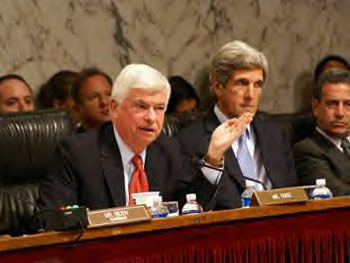 It’s not clear to whether Senate Banking chairman Chris Dodd simply lost his patience or was told by his Democratic brethren to end the fruitless attempt to negotiate with Republicans over financial regulatory reform.
It’s not clear to whether Senate Banking chairman Chris Dodd simply lost his patience or was told by his Democratic brethren to end the fruitless attempt to negotiate with Republicans over financial regulatory reform.
It doesn’t matter. The important thing is that Dodd finally called it quits and announced on Thursday that he will unveil his own bill on Monday without any Republican support.
If that means there is no financial reform this year, because Republicans block it by filibuster, it will be a setback for much-needed fixes to catastrophically broken system of regulation.
But the way things were going, this bill would have been worse than no bill. There comes a time when you need to tell the obstructionists to put up or shut up. As in health care reform, Democrats bent over backwards to lure Republican support for regulatory overhaul.
History will show this effort at bipartisanship was doomed from the start. Senator Richard Shelby of Alabama, the ranking Republican on Senate Banking, pretty clearly never had any interest in working with Dodd and the Democrats. Shelby had plenty of arguments on specific points, and some of them were good. But in talks I had with his senior staffers months ago, it was clear to me they had no coherent idea of what they wanted to accomplish. They were looking for reasons to object, and they kept finding them.
When Republican Sen. Bob Corker of Tennessee began negotiating with Dodd, it appeared as if he might get some traction. But when Corker essentially convinced Dodd to drop the independent consumer agency and replace it with a watered-down division in the Federal Reserve, you knew this was turning into a brain-dead compromise.
Fortunately for Dodd, Corker gave him yet another chance to preserve his dignity. Corker, clearly taking his marching orders from the GOP leadership, still wasnt’ satisfied with a consumer protection division that would in some ways be weaker than what we already have. According to Sewell Chan of the New York Times, Corker wanted to exempt pay-day lenders and a host of other dubious “non-bank” players from the consumer division’s oversight. And remember, the car dealers had already won protection in the House bill.
That wasn’t the worst of it. The evolving bill already had some gigantic regulatory exemptions for big traders in financial derivatives. Nor am I convinced it would have created a solid system for reining in Too Big To Fail institutions. Those issues are potentially more important than the exact location of a consumer protection agency — and potentially much easier to game.
Compromise has to be a part of legislation. But if one party doesn’t want to engage in the first place, there comes a point when it makes more sense to say “Basta!”
- Bulenox: Get 45% to 91% OFF ... Use Discount Code: UNO
- Risk Our Money Not Yours | Get 50% to 90% OFF ... Use Discount Code: MMBVBKSM
Disclaimer: This page contains affiliate links. If you choose to make a purchase after clicking a link, we may receive a commission at no additional cost to you. Thank you for your support!


Leave a Reply